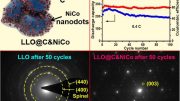
Recent research reveals nicotine e-cigarettes, alongside medications cytisine and varenicline, as the most effective smoking cessation aids. The study, encompassing over 300 clinical trials, provides crucial evidence for public health strategies.
Comprehensive global analysis from UMass Amherst researcher offers evidence to reshape public health policies.
Nicotine e-cigarettes and two prescription medications that curb symptoms of withdrawal are the most effective stop-smoking aids, according to a comprehensive, multinational review by a team of scientists, including a University of Massachusetts Amherst public health and health policy researcher.
Dual forms of nicotine replacement therapy (NRT), such as combining a patch with gum or a lozenge, were found to be nearly as effective.
Smoking remains the leading cause of preventable disease and death worldwide, and many people who want to quit smoking find it very difficult, due to the addictive nature of nicotine. The new study’s findings offer strong evidence to help reshape public health policies and strategies, offering smokers more effective tools to quit for good.

Jamie Hartmann-Boyce recently started her new role as assistant professor of health policy and management in the School of Public Health and Health Sciences at UMass Amherst. Credit: UMass Amherst
Research Insights and Methodology
“The best thing someone who smokes can do for their health is to quit smoking,” says Jamie Hartmann-Boyce, assistant professor of health policy and management in the School of Public Health and Health Sciences. “Our findings provide clear evidence of the effectiveness of nicotine e-cigarettes and combination nicotine replacement therapies to help people quit smoking. The evidence also is clear on the benefits of medicines cytisine and varenicline, but these may be harder for some people to access at the moment.”
Hartmann-Boyce is senior author of the paper published recently in the Cochrane Database of Systematic Reviews. She conducted the research at the University of Oxford, England, where she then worked as an associate professor and director of the Evidence-based Healthcare Ph.D. Program at Oxford’s Nuffield Department of Primary Care Health Sciences. The team also included colleagues at the University of Leicester in the UK.
Comprehensive Analysis of Smoking Cessation Methods
Nicola Lindson, lead author and a senior researcher at Oxford’s Nuffield Department of Primary Care Health Sciences, notes that the team compared the results for different stop-smoking aids that have been used in over 300 clinical trials involving more than 150,000 people.
“Our research dives deep into the world of smoking cessation,” she says. “By pulling together this data, we can see that when people use the medicines licensed for quitting smoking or nicotine e-cigarettes, they are more likely to quit than if they do not use these aids.”
Efficacy of Different Cessation Aids
The analysis found that around 14 of 100 people trying to quit smoking are likely to succeed using a nicotine e-cigarette, varenicline, or cytisine, in any given attempt to quit. For those using two forms of NRT, about 12 of 100 will likely quit smoking, defined as no smoking for at least six months. The success rate drops to around nine in 100 for those using only one form of NRT, such as a patch or gum.
Those rates compare to the finding that around six in 100 people will be successful at quitting smoking without any aids. Stop-smoking aids work better when people also receive behavioral support to quit. Serious side effects were rare for all the stop-smoking options, the study also found.
Considerations on Long-term Effects and Accessibility
Hartmann-Boyce points out that the long-term effects of using nicotine e-cigarettes are not known, but she emphasizes that the studies the team reviewed were testing regulated nicotine-containing e-cigarettes without additional additives known to cause harm. This review focused exclusively on evaluating the effects of a range of smoking cessation methods and did not set out to investigate broader aspects of the public health discourse regarding e-cigarettes, including their use among nonsmokers and young people.
“Nicotine itself is not the thing that causes the many diseases we associate with smoking,” Hartmann-Boyce says. “Broad scientific consensus is that regulated nicotine e-cigarettes are highly, highly likely to be much less harmful than conventional cigarettes, but not harmless.”
Both varenicline, a World Health Organization essential medicine, and cytisine help reduce the symptoms of withdrawal. The brand-name form of varenicline – Champix – is not available in the U.S. and other parts of the world due to a manufacturing problem, though generic forms of varenicline have been approved by the FDA. Cytisine is not currently licensed or marketed in the U.S. and most other countries outside of Central and Eastern Europe.
Reference: “Pharmacological and electronic cigarette interventions for smoking cessation in adults: component network meta‐analyses” by Nicola Lindson, Annika Theodoulou, José M Ordóñez-Mena, Thomas R Fanshawe, Alex J Sutton, Jonathan Livingstone-Banks, Anisa Hajizadeh, Sufen Zhu, Paul Aveyard, Suzanne C Freeman, Sanjay Agrawal and Jamie Hartmann-Boyce, 12 September 2023, Cochrane Database of Systematic Reviews.
DOI: 10.1002/14651858.CD015226.pub2









I was a heavy smoker a decade back, finally passive smoke effect on other members of the family made me decide to quit smoking without much ado, just like that threw away unfinished pack of cigrets along with lighter for good. After that never craved for smoking.one has to have the necessary resolve.
Well done. It seems to be that way for some people, some quirk of personality or biochemistry. I believe dependency is different and separate from addiction. I was dependent on nicotine, and stopping was deeply unpleasant, but like you, I found I had no addiction. It could be specific chemicals, because caffine on the other hand…
I’m very glad this study reaffirms that nicotine liquids can provide the same satiation and effectively substitutes for tobacco. As addictive as nicotine is, and despite it being in the dangerous tobacco plant, it has health benefits, and a similar safety profile to caffine. Vaping has its own complicated health issues, from aldehyde flavors and combusting colorants and vitamin-E adulterants, but those dangers get discovered and eliminated. This study is a good response to all the alarmist anti-vaping articles, although it only found low-certainty evidence for a decrease in the number of “Serious Adverse Events” I hoped to see. Hopefully that gets bourne out by more studies, or by further refinement of the products.